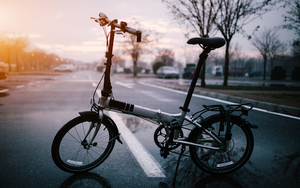Are Electric Scooters Legal in Cambridge?
Sep 11, 2024
Electric scooters have become increasingly popular in recent years as a convenient and eco-friendly mode of transportation. However, the legality surrounding these two-wheeled vehicles can be confusing, especially in cities like Cambridge. In this article, we will explore the intricacies of electric scooter laws in Cambridge, the ongoing debate surrounding their legality, the consequences of illegal use, and how riders can navigate the evolving legal landscape.
-
Understanding electric scooter laws
-
The debate around electric scooter legality in Cambridge
-
Consequences of illegal electric scooter use
-
Navigating the legal landscape for electric scooters
-
Conclusion
Understanding Electric Scooter Laws
Before delving into the specifics, it is essential to understand the basics of electric scooter legislation. Electric scooters, also known as e-scooters, are classified as Personal Light Electric Vehicles (PLEVs) in the UK. According to the Department for Transport (DfT), PLEVs are illegal to use on public roads and pavements, with a few exceptions.
The Basics of Electric Scooter Legislation
Currently, electric scooters are only legal to ride on privately owned land with the landowner's permission (the Ducati Scrambler Cross-E electric scooter makes for a great off-roading vehicle). This means that riders cannot legally use e-scooters on public roads, cycle paths, or pavements in most cases. The DfT has stated that electric scooters must meet certain criteria to be considered legal for road use, including a maximum speed of 15.5 mph, a power output of 500 watts, and a weight limit of 55 pounds (25 kilograms).
Specific Laws Pertaining to Cambridge
In Cambridge, electric scooters are subject to the same regulations as the rest of the UK. Therefore, they are not permitted on public roads or pavements. However, it's worth noting that the city has joined several UK cities in participating in e-scooter trials authorised by the DfT. These trials allow certain designated areas and roads in Cambridge to be used by rental e-scooters provided by approved operators such as Voi. Riders must adhere to the specific guidelines and rules set by these operators when using rental e-scooters in the trial areas, ensuring their safety and that of others around them.
Cambridge, with its rich history and vibrant academic atmosphere, is a city that embraces innovation and sustainable transportation. As part of its commitment to exploring alternative modes of travel, the city has eagerly embraced the e-scooter trials authorised by the DfT. These trials not only provide residents and visitors with a convenient and eco-friendly transportation option but also serve as a valuable opportunity to gather data and insights on the feasibility of integrating electric scooters into the city's existing infrastructure.
During the trials, designated areas and roads in Cambridge have been carefully selected to ensure the safety and efficiency of e-scooter usage. This meticulous planning takes into account factors such as traffic flow, pedestrian footfall, and the overall impact on the city's transportation network. By implementing these trials, the city aims to assess the viability of e-scooters as a long-term solution to address the challenges of urban mobility while minimising the environmental footprint.
As with any new mode of transportation, safety remains a top priority. Rental e-scooters provided by approved operators are equipped with advanced safety features, including built-in lights, reflectors, and speed limiters. Additionally, riders are required to wear helmets and follow the designated routes and guidelines set by the operators. These measures are in place to ensure the well-being of riders and pedestrians, promoting a harmonious coexistence between e-scooters and other road users.
While the trials in Cambridge offer a glimpse into the potential of electric scooters, it is important to remember that the current legislation still restricts their usage on public roads and pavements. As the trials progress and valuable insights are gained, policymakers will have a better understanding of how to shape future regulations and integrate electric scooters into the urban landscape. Until then, residents and visitors can enjoy the convenience and excitement of e-scooters within the designated trial areas, contributing to the ongoing exploration of sustainable transportation solutions.

The Debate Around Electric Scooter Legality in Cambridge
The legality of electric scooters has sparked debate and raised concerns among various stakeholders. Let's take a closer look at some of the key factors contributing to these discussions.
Safety Concerns and Legal Implications
One of the primary arguments against legalising electric scooters for public road use is safety concerns. Critics argue that the current infrastructure is ill-equipped to handle the increased presence of e-scooters, potentially leading to an increase in accidents and injuries. Additionally, issues such as speed and rider behaviour are also important considerations when assessing the implications of allowing electric scooters on public roads. Within the last year, there were 35 casualties involving e-scooters within Cambridgeshire.
Public Opinion in Cambridge
Public opinion on electric scooters in Cambridge remains divided. Some residents and businesses see the potential benefits of e-scooters, such as reducing traffic congestion and lowering carbon emissions. However, others express concerns about safety, particularly for pedestrians and cyclists who share the paths with scooter riders. Engaging the public in these conversations and considering their feedback is essential in shaping future legislation.
Consequences of Illegal Electric Scooter Use
Using electric scooters illegally can have significant consequences, both legally and financially. It is vital for riders to be aware of the potential penalties and impact on insurance policies.
Legal Penalties and Fines
Riding an electric scooter illegally on public roads or pavements in Cambridge can result in penalties, including fines of up to £300 and six penalty points on the rider's driving licence. Additionally, if a rider causes harm or is involved in an accident while using an electric scooter illegally, they may face criminal charges, damages claims, and the potential loss of insurance coverage. Across the UK, many electric scooters have been confiscated due to illegal riding.
Impact on Insurance Policies
Using an electric scooter on public roads or pavements without appropriate legal permission can invalidate insurance policies. It is crucial for riders to check with their insurance providers to understand the coverage and implications related to electric scooter use. Riding within the guidelines of authorised trials or on privately owned land can help mitigate these risks.

Navigating the Legal Landscape for Electric Scooters
As the popularity of electric scooters continues to rise, advocacy groups and individuals are working towards legal changes to accommodate these vehicles. Here are some avenues being explored:
Advocacy for Change in Legislation
Advocacy groups are actively campaigning for changes to electric scooter legislation, aiming to allow their safe use on public roads and cycle paths. They argue that legalising e-scooters can support efforts to reduce traffic congestion, improve air quality, and provide an accessible and convenient transportation option for short-distance travel.
Future Predictions for Electric Scooter Laws in Cambridge
While the future of electric scooter laws in Cambridge remains uncertain, the ongoing trials provide valuable insights into their impact on the city's transportation landscape. Feedback from participants, residents, and stakeholders will likely influence future decisions and legislation. It is essential to monitor these developments and stay informed about any changes that could affect electric scooter use in Cambridge.
Conclusion
In conclusion, electric scooter laws in Cambridge and the UK, in general, prohibit their use on public roads and pavements, with exceptions made for authorised trials and privately owned land. Understanding the legal landscape, the consequences of illegal use, and actively participating in the debate for change are essential for riders and advocates alike. As the legal framework evolves, it is crucial for everyone involved to prioritise safety and work towards finding a balance between e-scooter mobility and public well-being.






